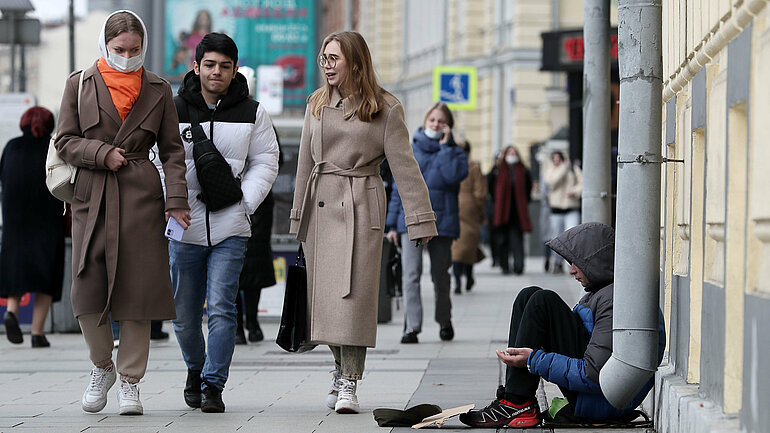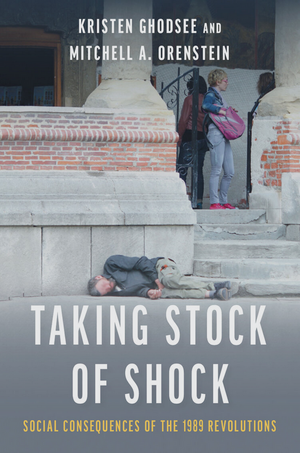"We have to look at transition as a broader type of crisis"

In their book ‘Taking Stock of Shock’, Kristen Ghodsee and Mitchell A. Orenstein look at the outcome of 30 years of transition in post-communist countries. In light of the different experiences of this transition across Eastern Europe, they see a need for a narrative that encompasses both disaster and success.

Other than the 30th anniversary of the fall of communism this year, what was your motivation to write the book?
It started with a blog post by the Serbian-American economist Branko Milanovic that stated ‘The wall fell only for some’. I was debating it with my colleague Kristen Ghodsee and we realised that we had totally different views about what the political, economic and socioeconomic outcomes of transition were, in part because of the countries that we studied. She had focused on Bulgaria, which clearly has not thrived, whereas I had worked on the Czech Republic and Poland, which have done relatively well.
In fact, two very contradictory narratives of transition have dominated popular and policy discourse. One is the J-curve narrative that describes an initial economic loss followed by a dramatic improvement. This narrative is more prominent in the West. But there's another narrative pushed by Russian president Vladimir Putin that portrays the 1990s as an absolute disaster. This second narrative is also widespread in the region. At the outset of this project, we thought that if we gather enough data we can prove which of these two narratives is right.
The surprising thing that we found is that both perspectives were right. On the one hand, some countries and some people definitely had a J-curve transition and things are far better now than they were before. But other people experienced an absolute socioeconomic calamity. And the book really became more about trying to map out who suffered catastrophically during the transition versus who did well.
So who are the winners and losers of transition?
By and large, the Visegrad countries are doing relatively well. Poland, the Czech Republic, Hungary, Slovakia, and to some extent Slovenia, and some of the Baltic states, particularly Estonia. Every other country in the post-communist region suffered a catastrophic rupture. The economic collapse experienced by the average post-communist country was far worse than the Great Depression during the 1930s. It's hard for people to understand just how bad things were economically, because at the same time some people were doing remarkably well.
But it’s important to disaggregate the crisis. In one respect, it's an economic crisis, but in other respects, it’s a demographic crisis. Mortality rates went up, while fertility rates declined considerably. Russia had one of the biggest falls in life expectancy ever in world history, particularly among males in peacetime. Also, out-migration was a big, highly controversial topic. There are countries like Bulgaria that have just been emptied out of people. Countries differed in terms of the kinds of crises they faced, but they all suffered a confluence of massive crises. We have to look at transition as a broader type of crisis and one that had a profound effect on all post-Soviet countries.
How did your different disciplinary backgrounds shape your perspectives on the topic and your methodological approach to the data?
Our different views on transition were also a result of our disciplines. The social sciences really don't yet have a consensus about what happened in 30 years of transition. Kristen Ghodsee is primarily in anthropology and I'm in political science, but a lot of the debate has been focused on economics. However, the economic data is not very clear because, of course, the communist economies all measured their development using criteria other than GDP. So we thought it was necessary to bring in more from political science and sociology, demographic data, but also public opinion data and ethnographic data. Nobody had ever really done a review of all the ethnographic work on transition. This interdisciplinary triangulation of data was the key method really. It was an attempt to see what each discipline had to say and then to compare and contrast, and ultimately to weave together a new narrative about transition.
You were looking into data from 29 countries. What narrative have you come up with?
There is no question that the existing narratives are very intentional and politicised, which is another reason why people haven't really fully understood what happened after 1989. That’s why we developed a third narrative from an inequalities perspective. Implementing capitalism after communism brought a vast increase in inequalities, which created unprecedented opportunities for some people but also destroyed the protective social net that a lot of other people depended upon. Multiple inequalities are visible between countries, but also within countries. An inequalities perspective helps us to understand the really diverse and contradictory results of transition, and also how they shape politics within any specific country.

Could you give an example of inequality within a specific country and how the dominant narratives are being politically exploited today?
There is, for instance, the whole discourse of Poland A versus Poland B. In Poland A, mainly located in the capital city and other major urban centres, westernising tendencies dominate and everything's going really well. But there's also a Poland B, which is relatively underdeveloped, where the national-conservative Law and Justice party gets the majority of its votes.
I think that the dominant narrative in the West was ‘Well, you need to make all these reforms and then everything's going to be amazing’. And as it turned out, everything wasn’t amazing. So I think that there's a legacy of an unfulfilled promise. There’s a deep public distrust of dominant narratives, a legacy of serious issues that have not been addressed. And now, a lot of countries feel that they need a dictator to put this right. That they need to reject the West and reject democracy, Western norms and even corporations to some extent and follow their own path, which is much more nationalistic and authoritarian.
And we think there's a need for a new kind of capitalist economy that is much more attentive to the disasters that happened. That's proving to be really difficult because of the politicisation, frankly, of most Western institutions. They simply don't believe that there was a socioeconomic disaster after communism and don't think that anything really needs to be done. What we’re seeing is a tragedy of liberal discourse in the region. And I think, conversely, that there's also a tragedy of the alternative ‘disaster’ discourse. By this I mean that the solutions favoured by opposing anti-Western forces are also dysfunctional. They're not serious about governance and they tend to be put forward by groups that are very corrupt and just want to continue to gain from a difficult situation. So I think ultimately we wrote this book because by looking truthfully at what happened in the transition countries, we can provide a more accurate picture that could be the basis for a different type of approach in the future.
The interview was conducted by Yvonne Troll, communications coordinator at ZOiS.
Mitchell A. Orenstein is Professor and Chair of Russian and East European Studies at the University of Pennsylvania and Senior Fellow at the Foreign Policy Research Institute.
Kristen Ghodsee, Mitchell A. Orenstein: Taking Stock of Shock. Social Consequences of the 1989 Revolutions. Oxford University Press, 2021.